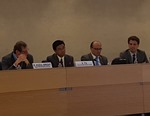Social Watch E-Newsletter - Issue 319 - November 10, 2017
Published on Fri, 2017-11-10 16:48
 |
| Issue 319 - November 10, 2017 |
|
|
Social Watch reports
Spotlight report on the 2030 Agenda
|
|
|
| |
|
| |
The right to water in Mexico
|
| |
|
| |

Photo: Creative Commons
License/Manuel
|
Water is a key concern in Mexico, where 100 civil society organizations submitted a joint report to the UN documenting how “privatization policies benefit extractive industries and mega-projects instead of reducing inequalities in access to essential services”. Users with difficulties in paying the increased tariffs are being denied their human right to water and the quality of the water distributed has deteriorated so much in many places that in Aguascalientes 95 percent of the water people drink is bottled. The report points out that water issues affect women disproportionately. “When there is a shortage, irregular delivery or bad quality water, women spend more time to bring water to their homes, boil it, filter it and deal with the authorities, frequently adding up to 30 hours a week to their domestic work.” The Mexico Social Watch report emphasizes that “insufficient and ineffective regulations on environmental and social impact, have led to numerous cases of violation of fundamental rights due to business activities”. The government “has not accomplished its constitutional obligation to protect human rights, affected by the proliferation of large-scale projects by private or public-private investment without prior, free, informed and culturally adequate consultation”. Frequent protests have resulted in suppression, including imprisonment and physical assault. Lack of due diligence, access to justice and compliance with judicial decisions in cases of human rights violations involving companies are the norm in Mexico, the report concludes. Read more
|
| |
|
| |
|
| |
Health for profit in Egypt
|
| |
|
| |
In Egypt the World Bank argues that the gains in mortality rates and life expectancy levels achieved since the beginning of the last century will not continue if the private sector is not involved, due to the government's failure to devote more resources to the health sector and a lower possibility of improving unhealthy daily habits of poor people.
The Social Watch report notes that while the government has announced the creation of PPPs in the Smouha Maternity University Hospital and Blood Bank and Al Mowasat Hospital, the PPP central unit has not made public the details of the projects, nor the nature of the investors’ responsibilities. Nor has it announced the main investors in the projects or the improvements that they are expected to achieve. All that is known by civil society is that the PPPs will be implemented and partially managed by Bareeq Capital, DETAC Construction & Trading, Siemens Healthineers and G4S Company. Read more
|
| |
|
| |
Social Watch publishes country reports 2017
Social Watch coalitions around the world are contributing their assessments and reports to the global Social Watch report 2017 on the national implementation of the 2030 Agenda in its first year. Stalled, or slipping back, is the theme that appears in many of the contributions. Natural and un-natural disasters, some of them of catastrophic proportions, appear again and again not just as an obstacle to faster progress towards the agreed goals, but in fact setting the clock back. Part of the reason for lack of progress has to do with an over-reliance on public-private partnerships, urged by the World Bank as a way to finance implementation of the SDGs.
The Social Watch national platforms are independent coalitions of civil society organizations struggling for social and gender justice in their own countries. The Social Watch network has been publishing since 1996 yearly reports on how governments implement their international commitments to eradicate poverty and achieve equality between women and men.
|
| |
|
| |
|
| |
 |
The informal economy comprises half to three-quarters of all non-agricultural employment in the developing countries, Roberto Bissio, coordinator of the Social Watch international secretariat in an article on "Past and future of informal workers" published by the Arab NGO Network for Development (ANND) as part of its report on informality in the Arab region. The study combats the notion that informality in developing countries is associated with "traditional" or "backward" sectors in the economy, and exposes as contributors to present-day informality the pressure to reduce the state and its control by international financial institutions like the World Bank, the benefits obtained by multinational corporations from cheaper labour and flexibility in workers' contracts and the "uberification" of the economy through online outsourcing of small pieces of work. Paradoxically, when there is political work, those same technologies can make formalization and provision of basic social security easier and more efficient. Read more
|
|
| |
|
| |
|
| |

Photo: South Centre
|
The third meeting of the open-ended inter-governmental working group (OEIWG) for the elaboration of a treaty to make transnational corporations accountable for their human rights violations was held at the United Nations in Geneva last October. 101 countries attended the meeting, the largest number since the discussions started two years ago.
After the 3rd session of the OEIWG, the process will continue moving towards developing a negotiating text for a draft legally binding instrument on business and human rights. The Chairperson-Rapporteur had stressed that “the mandate from the UN Human Rights Council is clear…the working group should continue working until it reaches a legally binding instrument…there is absolutely no ambiguity as to the nature of the mandate”. He underlined the historic nature of the process, pointing out that it “addresses one of the major problems of the global social contract in the 21st century”. Read more
|
|
| |
|
|
|
| |
|
SOCIAL WATCH IS AN INTERNATIONAL NGO WATCHDOG NETWORK MONITORING POVERTY ERADICATION AND GENDER EQUALITY Social Watch >>
Social Watch E-Newsletter For comments, sugestions, collaborations contact us at: socwatch@socialwatch.orgTo stop receiving this newsletter send a message with the subject "unsubscribe" to: socwatch@socialwatch.org |
|
|
|
SUSCRIBE TO OUR NEWSLETTER
Submit
|
